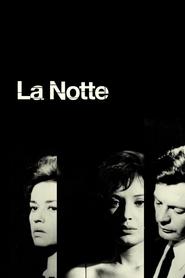Antonioni has Mastroianni and Moreau restrain themselves; he leaves overt theatricality to other characters, whose flamboyant expressivity is more or less the mark of their insubstantiality, insincerity, or frivolity; their brazen self-assertion in the fullness of the moment seems blind and trivial. Giovanni passes through the world with a withholding temperament that presumably feeds a keen and discerning sense of observation but that also results in a peculiar passivity—he goes where he’s invited, he yields almost somnolently to seduction in grotesquely inappropriate situations—as a result of which his handsome and finely set features seem as featureless as a mirror. Meanwhile, Lidia, a capable, sensitive, intelligent, and worldly woman, is emptied out by her subordination to Giovanni’s existence; her own intellectual life has become merely a reflection of his—a reflection of a reflection.
— Richard Brody (Criterion)
Antonioni’s simultaneously sympathetic and unforgiving rendering of the nascent tensions between his characters, and the subsequent ruptures which push and pull them apart and then back together, which prevents the film from becoming simply a clinical exercise in mismanaged ennui and more of a turbulent dissection of romantic longevity.
— Jordan Cronk (Slant Magazine)
In one of many interesting bits of subversion within La Notte, a high point among Antonioni’s career of creating actualized female characters and utilizing the female gaze, Lidia and Valentina don’t see each other as enemies once they cross paths. Rather than taking a combative stance with one another, there is a recognition of their places within the patriarchal world they inhabit. Lidia is what Valentina will likely one day become, and somehow they both know it.[…]
It’s telling that [the] large villa is made mostly of glass walls. As Lidia tours the estate, and Giovanni and Valentina do a dance of temptation back and forth, the characters can see each other. The glass between them obfuscates their vision. You can see the person on the other side of the glass pane, but you can’t get in. It’s a mirage of connection. In reality, it only keeps them apart and, instead, allows them the opportunity to reflect on themselves.
[…]
After two hours spent fixated on Moreau’s forlorn face, wandering the remnants of the life she wishes she could have had, the camera can’t take it anymore. Antonioni pans away as Lidia continues to resist, and Giovanni remains insistent that this is what love looks like.
— Mitchell Beaupre (Paste Magazine)

